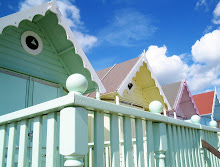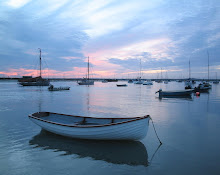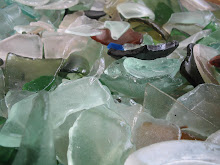
It's been a little ongoing project of mine to transcribe the handwritten memoirs of his experiences in the First and Second World Wars that my grandfather wrote not long before his death in 1974. My intention was - and remains - to gather together not only his writings on the subject, but also a selection of photographs so that I can turn them into a short self-published book for family and friends.
I haven't finished yet, but in honour of Remembrance Day I've decided to post what I've done so far on a dedicated site, The War Memoirs of Edward Dennis Deane 1895-1974.
As I say in my (not-as-brief-as-I'd-intended) Introduction, this is not great literature - my Grandad was no undiscovered Sassoon or my family's answer to Wilfred Owen.
The most - possibly the only - notable thing about this brief document is that Private Den Deane fought in Gallipoli and at Ypres and in Italy and on the Somme . . . and survived them all.
I've been taken to task by some readers of this blog for my comments on the current war in Iraq. They spoil the light, provincial ambience of my musings and generally mark me down as an unthinking propagandist, apparently. Well here's another facet to consider - my interest in Iraq goes back further than you might think. To 1922, in fact - when my Grandfather was posted there with the RAF. It was a country that he loved, and he talked about it often, and his set of six engraved Iraqi brass egg-cups sits here in my study as I write this.
Anyway - it's all there for anyone whose thoughts this weekend, like mine, are of Remembrance.





















4 comments:
Your post has certainly evoked some memories for me. My father was born in 1922 and served in the RAF in World War II. Your post has made me think about his war experiences in Burma where he performed aka 'Some Like it hot' and where he also went down with dysentery and was sent off with others to die but he survived. My brother and I loved to snuggle up with him in bed of a Sunday morning and sing along with him from the little red book in which had written the words to the songs he sang during those war days. He never spoke about the dark side of those days but remembered the friendships, the fun he had with these performances and the love he had for the camp dog 'nigger' (sorry but that was what he was called). He chose not to burden us with the horror and fear he must have felt because he loved us too much (and now that's made me cry so I'll stop). Thanks for touching a nerve - I don't have anything to say about war - I just know my father was part of it and I miss him.
Teresa - Thanks for sharing these precious memories of your fathers. I was in floods writing that introduction to my Grandad's writing - it brought back so much and I still find it hard to understand how a man who had been through so much when not much more than a boy could have returned to lead such a 'normal' life. But like so many - including your father - that's exactly what he did. I find such strength enormously humbling, and am proud to have his blood running through my veins. Not proud of what he had to do, but proud to have known him.
Memories such as these are so precious; they tell the story of war in a way that no official history can.
In the 1990s, my brother and I made the journey to the Faubourg d'Amiens cemetery in northern France where, on one of the walls of the Arras Memorial, the name of our great-uncle Laurence is inscribed. He served in the second battalion London Regiment (Royal Fusiliers) and died on 15 June 1917, aged just 19. As with so many other WWI fatalities, the military action in which he died was so fierce and on such a scale that his remains were never found. But at least his name is there, hopefully in perpetuity.
My brother, who was born in 1927, was named after him and we were the first family members to visit the Arras Memorial. So, 80 years after his death, we were at last able to pay a silent tribute to our great-uncle and to that lost generation of young men. We will be remembering them again on Sunday.
(We found the exact date of his death, his military details and where he was commemorated thanks to the excellent Commonwealth War Graves Commission website.)
My brother served in the army in the final years of WWII and is immensely proud to lead the Remembrance Day parade each year at his village chuch on a hillside in Wales. I have made a point of writing down all his remarkable wartime memories, over a series of 'interviews' so that, one day, his grandchildren and great-grandchildren will be able to read about the extraordinary things that he did and achieved while he was still a teenager.
Thank you so much for this, Diane, and very well done for writing down you brother's wartime memories. That will be something to treasure. And there are lots of archive collections which would be grateful for a copy, too, I'm sure. I've so often wished that I'd 'interviewed' both my grandfathers before they died. Not just about their wartime experiences but about their childhoods and all kinds of things. I'd even acquired my first cassette recorder in the last year of Grandad Deane's life, but I was too busy recording songs off the Radio to think of putting it to far better use. I can still hear his voice very clearly in my head, but have nothing to play to his great-grandchildren.
Post a Comment